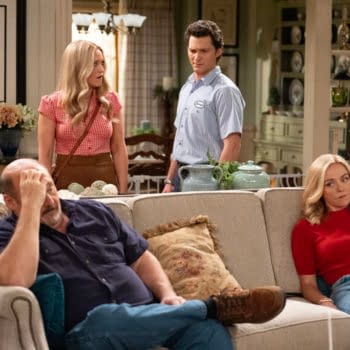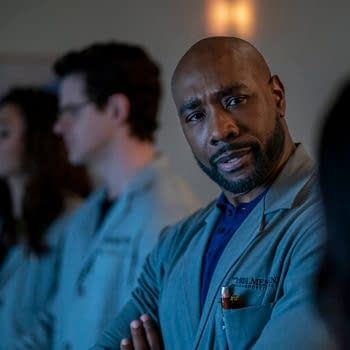Posted in: BBC, Doctor Who, TV | Tagged: bbc, doctor who, game of thrones, jenna coleman, Maisy Williams, matt smith, peter capaldi, steven moffat
Doctor Who Series 9 Would Be Steven Moffat's Most Interesting Season
Let's look back to Doctor Who Series 9, Steven Moffat's most interesting & consistent season, and Peter Capaldi's second as The Doctor.
The BBC has released a compilation of moments from Series 9 of Doctor Who, the modern era. It's a minor miracle for any drama series to reach nine seasons these days, let alone a Science Fiction series. Then again, if you count the seasons of the old show before they got cancelled, Doctor Who has had over thirty seasons by now. This was Steven Moffat's fifth season as showrunner and Peter Capaldi's second as The Doctor. it's also Moffat's best and most thematically consistent season.

Unlike Doctor Who Series 6, Moffat's second season as showrunner, and Matt Smith's second season as The Doctor, Series 9 feels more confident and less frantic in trying to show off crazy ideas with wild abandon. It's also less overstuffed and more emotionally resonant than Series 6. The video compilation concentrates on the season's most interesting ideas and plays on old enemies like The Daleks and The Master, now Missy, who is played with gleeful relish by Michelle Gomez on her way to a redemption arc in the next season. It introduces Maisy Williams in her first major post-Game of Thrones role as Ashildr and her arc about the price and horror of immortality in contrast to The Doctor's. It gave Capaldi's Doctor more of his best speeches, including the one about war, which is often credited to Moffat but was really written by Peter Harness with some tweaks by Moffat. It gave us "Heaven Sent," still considered one of the finest pieces of Science Fiction television and a brilliant allegory for grief and loss.
What's most notable is that Peter Capaldi played a different Doctor in each of his three seasons. In his first season in Series 8, he was a prickly alien unsure of emotions, his own and humans, almost as if he was on the autism spectrum if he was human, and Moffat's writing risked making him unlikeable, which Capaldi played with total conviction without ever trying to make himself likable to the audience. In Series 9, he was closer to what we're used to in The Doctor, the cheeky genius, but Capaldi's age gave him the edge of an older man who's seen and lived through too much. Moffat also turned his relationship with Clara (Jenna Coleman) into an allegory for an older man in a midlife crisis and his co-dependent relationship with a younger woman that becomes dangerous and even toxic. That relationship and Clara's addiction to emulating The Doctor ultimately causes her death, which is one of the most tragic companion arcs in Doctor Who, but their final goodbye is also one of the series' most poignant. Then in the next season, the show was reset, and Capaldi played the closest to a "classic" Doctor but updated to Moffat's sensibilities in possibly the most underrated season of modern Doctor Who.













